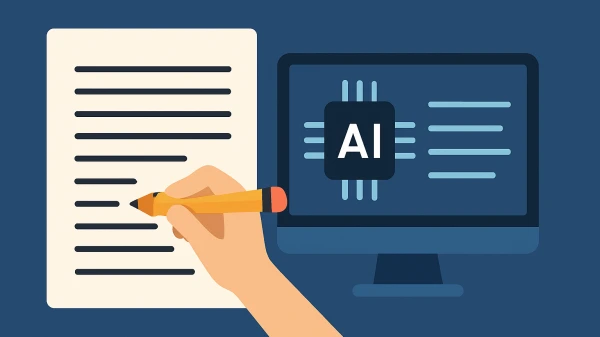Unlock Insights: Find the Answers You Seek on Our Blog
Finding Inspiration for Book Title Ideas: A Guide for Writers and Creatives
By Evelyn Sterling
A good book title is more than a label; it’s a key factor influencing a reader’s decision to choose a book amidst fierce market competition. It not only provides a distinct identity but also ensures the book connects with its target audience. Crafting the right title is a complex yet rewarding process, blending creativity with marketability and searchability.
This guide will walk you through finding the perfect book name, from initial inspiration and brainstorming to evaluating choices against legal and marketing considerations. Our goal is to help authors and creatives develop a title that reflects their work’s essence and appeals to potential readers, making their book a standout choice.
Understanding the Essence of Your Book
Before you start the process of choosing your book’s title, it’s imperative to grasp fully what it’s about. This understanding forms the bedrock of a title that truly resonates. To achieve this, focus on distilling the theme, plot, and characters into their most elemental forms.
Tips for summarizing the book’s theme, plot, and characters.
- Theme: Identify the central idea or message that drives the narrative. Is it love, freedom, justice, or perhaps the human condition? Understanding this will help you find a title that speaks to the broader, universal aspects of your story.
- Plot: Outline the main storyline in a few sentences. Consider the key events and how they unfold from beginning to end. A good title can hint at the narrative arc or the conflict that propels the story forward.
- Characters: Think about your protagonists and antagonists. Their names, traits, or journeys can be a rich source of inspiration. A memorable character can lend their name to the title, instantly giving readers a taste of the story’s flavor.
How to reflect the core message of your book in its title.
Once you have a clear summary of your book’s theme, plot, and characters, it’s time to weave these elements into a compelling title. Here’s how:
- Synthesis: Look for the intersection where theme, plot, and character meet. Your title should encapsulate the essence of this intersection, providing a snapshot of the story’s heart.
- Imagery and Emotion: Use powerful imagery or emotive words that capture the spirit of your book. A good title evokes curiosity or emotion, prompting the reader to delve into the story.
- Clarity and Mystery: Strike a balance between being clear and creating intrigue. While your title should give an idea of what the book is about, it should also leave enough mystery to entice readers to want more.
- Uniqueness and Relatability: Aim for a title that stands out yet resonates with your target audience. It should be unique enough to differentiate your book but relatable enough to attract readers who are interested in your genre or theme.
Understanding the essence of your book and reflecting it in your title is a creative challenge. It requires a deep connection with your work and an understanding of how it might be perceived by potential readers. By meticulously summarizing the book’s theme, plot, and characters, and then artfully reflecting these in your title, you set the stage for a compelling narrative invitation that is hard to ignore.

The Brainstorming Book Title Ideas Process
Brainstorming for the perfect book title is a creative exercise that can take various forms. Here are some techniques to unleash your creativity and organize your thoughts effectively.
Techniques for Brainstorming Book Names
- Mind Mapping: Start with the core theme or plot of your book at the center of a page and branch out with related words, characters’ names, key events, and thematic elements. This visual layout can help you see connections and combinations that might not be apparent in a linear list.
- Free Writing: Set a timer for a focused period, say 15-20 minutes, and write down all title ideas that come to mind without editing or judging them. This flow of consciousness can unearth unique and bold titles.
- Word Association Games: Write a word related to your book and then jot down the first thing that comes to mind for each subsequent word. This chain can lead to surprising and innovative title ideas.
- Thesaurus Diving: Look up keywords related to your book in a thesaurus for synonyms that might offer a fresh angle or a more precise expression of your theme.
Organizing and Refining Your Ideas
- Categorization: Group your brainstormed ideas into categories like “Character-Driven,” “Plot-Driven,” “Thematic,” or “Emotional.” This can help you assess which aspects of your book you most want the title to reflect.
- Prioritization: Rank your title ideas based on how well they capture the essence of your book, their memorability, and their marketability. Consider asking friends, colleagues, or potential readers for their impressions to get a sense of which titles resonate most.
- Feedback and Iteration: Share a shortlist of your top title ideas with a trusted group of peers or readers and gather feedback. Be open to suggestions and willing to tweak or combine titles to find the perfect fit.
- Sleep on It: Sometimes, stepping away from the brainstorming process for a bit can give you new insights. Allow your subconscious to work on the problem while you focus on other things, and return to your list later with fresh eyes.
The brainstorming process for finding the right book title should be dynamic and flexible. By employing various techniques and being thorough in organizing and refining your ideas, you can navigate the complex landscape of creativity and come out with a title that truly represents your book and captivates your audience.
Evaluating Potential Titles
Once you have a list of potential titles from your brainstorming sessions, the next step is to evaluate them critically to find the one that best suits your book. Here are some key criteria to consider and methods for testing how effective your titles might be.
Criteria for Selecting a Good Book Name
- Memorability: A good title should be easy to remember. It should stick in the mind of the reader, be catchy, and make an impact. Shorter titles often work well, as do those that use vivid language or imagery.
- Searchability: Consider how easily your title can be found online. Unique titles are more likely to show up in search results, whereas common or generic phrases might get buried. However, including keywords related to your book’s genre or theme can improve its visibility.
- Relevance: The title should reflect the content of the book accurately. Misleading titles can disappoint readers and harm your book’s reputation. Ensure that the title connects with the core themes, setting, or characters of your story.
Testing Titles with Target Audience or Through Feedback Loops
- Target Audience Feedback: Share your title options with a sample of your target audience to gauge their reactions. You can do this through social media polls, focus groups, or one-on-one interviews. Pay attention to which titles generate excitement, curiosity, or engagement.
- Feedback Loops: Incorporate feedback into your decision-making process. Don’t be afraid to iterate on your titles based on what you learn. Sometimes, a slight modification can make a big difference in how a title is perceived.
- A/B Testing: If you have a few strong contenders, consider A/B testing them in marketing materials, ads, or on your website to see which one attracts more attention and engagement from potential readers.
- Professional Opinion: Consult with publishing professionals, such as editors, literary agents, or marketers, who have experience in selecting effective book titles. Their insights can be invaluable in understanding market trends and consumer preferences.
By rigorously evaluating your potential book titles against these criteria and testing them with your intended audience, you can refine your choices and select a name that not only encapsulates the spirit of your book but also resonates with readers and stands out in the marketplace.
Utilizing AI Book Title Generator to Create Book Title Ideas
The AI Book Title Generator, a software program that uses artificial intelligence to generate potential titles for your book. Let’s explore what this tool is and how you can use it to spark your creativity.
What is Book Title Generator
An AI Book Title Generator is a tool powered by artificial intelligence, designed to create a wide array of potential book titles based on specific input parameters. It leverages natural language processing (NLP) and machine learning algorithms to produce creative, unique, and sometimes unexpected title suggestions. This tool can analyze vast databases of existing book titles, literary trends, and genre-specific keywords to suggest titles that are relevant and appealing.
Step-by-Step Guide to Using the AI Book Title Generator

Enter Your Book Summary
- In the first text box labeled “What is your book topic or summary?” type in a concise description of your book. This could be a brief outline of your plot, the central themes, or main characters. For example, if your book is a romantic comedy about two chefs, you could type in “A love story between two competing chefs in a bustling city”.
Select Your Language
- Below your book summary, you’ll find an option to “Choose Language”. Click on the dropdown menu and select the language in which you’d like the book titles to be generated. This typically should be the language in which you are writing your book.
Adjust Creativity Level
- You will see a slider under the heading “Choose Creativity Level”. This slider allows you to control how creative or unconventional the generated titles will be. If you slide it closer to the left (towards a lower number), the titles will be more straightforward and likely more genre-specific. Sliding it to the right (towards a higher number) will result in more creative and unique titles. The midpoint, often marked as ‘5’, is suggested for a balance of both.
Verify You Are Human
- Before generating titles, you need to complete a CAPTCHA verification. This is a security measure to ensure automated bots aren’t using the tool. Click on the “Verify you are human” checkbox.
Generate Titles
- Once you’ve completed all the above steps, click the “Generate” button, usually found at the bottom of the interface. The AI will process your inputs and provide a list of potential book titles.
Review the Suggestions
- After generating, the tool will display a list of book titles. Review these suggestions and see if any fit or inspire a title for your book. You can write down your favorites or take a screenshot to save them.
Iterate if Needed
- If you’re not satisfied with the initial suggestions, you can tweak your summary, adjust the creativity level, and generate more titles. Sometimes it takes a few tries to get the perfect fit.
Note: while AI can offer some compelling options, the final decision should resonate with your creative vision. Use these suggestions as a starting point or a way to kickstart your own creative process.
AI Tools Categories
Browse all AI tools by category
All AI Tools
229Amazon
5AI Writing Generator
85Article & Content Writing
35Branding & Identity
54Content Generation
170Creative Ideas
32Educational Resources
34E-commerce
14Etsy
6Events & Celebrations
13Facebook
6Gaming & Fun
5Instagram
3Lifestyle & Personal
8LinkedIn
6Marketing & SEO
40Poem & Lyrics Writing
19Professional Documents
31Social Media
44Story & Book Writing
49Text Effects
14TikTok
7Twitter
3Writing Enhancement
36YouTube
11
Highly rated and most popular AI tools curated by our experts
Recently added AI tools that are gaining traction
- AI Post Generator

- AI Bullet Point Generator

- AI Discussion Post Generator

- AI 2 Weeks Notice Letter Generator

- AI Content Creation Ideas Generator

- AI Radio Ad Script Generator

- AI Podcast Script Generator

- AI Resume Objective Generator

- AI Resume Headline Generator

- AI Password Generator

- AI Snapchat Caption Generator

- AI Snapchat Username Generator

- AI Pinterest Board Name Generator

- AI LinkedIn Experience Description Generator

- AI Twitter Hashtag Generator

- AI YouTube Short Idea Generator

we prioritize displaying the latest content closely related to the current blog post.







